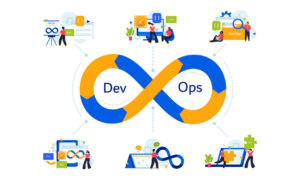Top 5 Emerging Technologies Shaping the Future of Business
August 28, 2024
The integration of emerging technologies is not just an option but a necessity for companies looking to thrive in this dynamic environment. These technologies are transforming industries, streamlining processes, and creating new opportunities for innovation. In this blog, we will explore the top five emerging technologies that are shaping the future of business.
1. Artificial Intelligence (AI) and Machine Learning (ML)
Artificial Intelligence and Machine Learning are revolutionizing the way businesses operate. These technologies enable machines to mimic human intelligence and learn from data, leading to smarter decision-making and automation of complex tasks.
Key Applications:
Predictive Analytics
AI and ML are being used to analyze vast amounts of data, allowing businesses to forecast trends, customer behaviors, and market conditions. This helps in making informed decisions and staying ahead of the competition.
Automation
Routine tasks such as data entry, customer service, and even complex processes like fraud detection can be automated using AI and ML, reducing human error and increasing efficiency.
Personalization
AI-driven algorithms can analyze customer data to offer personalized recommendations, improving customer satisfaction and driving sales.
Impact on Business:
AI and ML are not just tools for efficiency; they are catalysts for innovation. Companies leveraging these technologies can offer more personalized services, optimize their operations, and make data-driven decisions that give them a competitive edge. For instance, in the finance industry, AI is being used to predict stock prices and assess credit risk, while in retail, it helps in managing inventory and providing personalized shopping experiences.
2. Data Engineering
Key Applications:
Data Pipelines
Data engineers create and maintain data pipelines that collect, process, and store data from various sources, ensuring that the data is available for analysis in real-time.
Data Warehousing
Big Data Analytics
With the rise of big data, data engineering is crucial in handling and analyzing large datasets that traditional data processing tools cannot manage.
Authentication and Access Control
Put strong access control measures in place and uphold the least privilege concept. Set strong password restrictions and implement multi-factor authentication (MFA) for user accounts. Review and remove unused access privileges on a regular basis to reduce the possibility of unwanted access.
Impact on Business:
Effective data engineering allows businesses to harness the power of data for informed decision-making. By ensuring that data is accurate, accessible, and actionable, companies can uncover new opportunities, improve customer experiences, and optimize their operations. For example, in healthcare, data engineering enables the analysis of patient data to improve treatment outcomes, while in marketing, it helps in creating targeted campaigns based on customer behavior.
3. Chatbots
Intelligent chatbots are revolutionizing the way businesses interact with customers. Unlike the simple, rule-based chatbots of the past, today’s AI-powered chatbots are capable of understanding and responding to complex queries, learning from interactions, and delivering personalized experiences.
Key Applications:
Customer Support
Intelligent chatbots provide instant, accurate responses to customer inquiries, handling everything from common questions to more complex issues. They can seamlessly escalate matters to human agents when necessary, ensuring a smooth customer experience.
Sales and Marketing
Internal Communication
Within organizations, intelligent chatbots assist employees by automating routine tasks such as scheduling, retrieving information, and managing workflows, thereby boosting productivity.
Impact on Business
Intelligent chatbots enhance customer satisfaction by providing fast, accurate, and personalized support 24/7. They also help businesses reduce operational costs by automating repetitive tasks, allowing human agents to focus on more strategic activities. In industries like e-commerce and banking, intelligent chatbots are driving growth by improving customer engagement and streamlining processes, leading to increased sales and customer loyalty.
4. Internet of Things (IoT)
Key Applications:
Smart Devices
Industrial IoT (IIoT)
Supply Chain Management
Impact on Business
5. 5G Connectivity
The advent of 5G technology is set to revolutionize the way businesses operate by providing faster, more reliable internet connectivity. 5G offers significantly lower latency and higher data transfer speeds than previous generations of wireless technology, enabling a new wave of innovation.
Key Applications:
Enhanced Mobile Connectivity
IoT Expansion
Remote Work and Collaboration
Impact on Business
5G will unlock new opportunities for innovation across various industries. For example, in healthcare, 5G will enable real-time remote surgeries and telemedicine, while in manufacturing, it will support the deployment of smart factories where machines communicate and operate autonomously. Businesses that adopt 5G early will have a competitive advantage by offering faster services, improving customer experiences, and exploring new business models.
AscentInfo Solutions is at the forefront of technological innovation, helping businesses harness the power of emerging technologies like AI, IoT, and 5G. With expertise in data engineering and intelligent chatbot solutions, AscentInfo Solutions empowers companies to optimize operations, enhance customer experiences, and stay competitive in a rapidly changing digital landscape.
Wrapping It Up
The future of business is being shaped by these emerging technologies, each bringing its own set of opportunities and challenges. Artificial Intelligence and Machine Learning are driving smarter decision-making; Data Engineering is unlocking the power of data; Chatbots are enhancing customer interactions; IoT is connecting the physical and digital worlds; and 5G Connectivity is enabling a new era of innovation. Companies that embrace these technologies will be well-positioned to thrive in the evolving digital landscape, while those that lag behind may find themselves struggling to keep up. Now is the time for businesses to invest in these technologies and transform their operations for the future.




